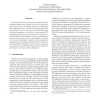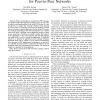127
click to vote
IPPS
2006
IEEE
15 years 8 months ago
2006
IEEE
Rational and selfish nodes in P2P systems usually lack effective incentives to cooperate, contributing to the increase of free-riders, and degrading the system performance. Variou...
122
click to vote
IPPS
2006
IEEE
15 years 8 months ago
2006
IEEE
Very large size Peer-to-Peer systems are often required to implement efficient and scalable services, but usually they can be built only by assembling resources contributed by ma...
125
click to vote
MIDDLEWARE
2007
Springer
2007
Springer
AVMEM - Availability-Aware Overlays for Management Operations in Non-cooperative Distributed Systems
15 years 8 months ago
Monitoring and management operations that query nodes based on their availability can be extremely useful in a variety of largescale distributed systems containing hundreds to thou...
118
Voted
ICN
2007
Springer
15 years 8 months ago
2007
Springer
—Peer to peer is an important way for files sharing. In existing P2P systems, users need to query and retrieve files, and have to know some knowledge, such as file names, keyword...
105
click to vote
PDP
2007
IEEE
15 years 8 months ago
2007
IEEE
In the process of developing P2P systems simulation has proved to be an essential tool for the evaluation of existing and conceived P2P systems. So far, in practice there has been...
ICC
2007
IEEE
15 years 8 months ago
2007
IEEE
—When constructing an unstructured P2P topology, one should consider the application running on top of it in order to achieve a good performance for the whole P2P system. It is n...
99
Voted
ISSRE
2008
IEEE
15 years 9 months ago
2008
IEEE
Developing peer-to-peer (P2P) systems is hard because they must be deployed on a high number of nodes, which can be autonomous, refusing to answer to some requests or even unexpec...
122
click to vote
WWW
2004
ACM
16 years 3 months ago
2004
ACM
We present a modularized storage and indexing framework that cleanly separates the functional components of a P2P system, enabling us to tailor the P2P infrastructure to the speci...
106
click to vote
WWW
2006
ACM
16 years 3 months ago
2006
ACM
In this paper, we propose a decentralized collaborative filtering (CF) approach based on P2P overlay network for the autonomous agents' environment. Experiments show that our...




